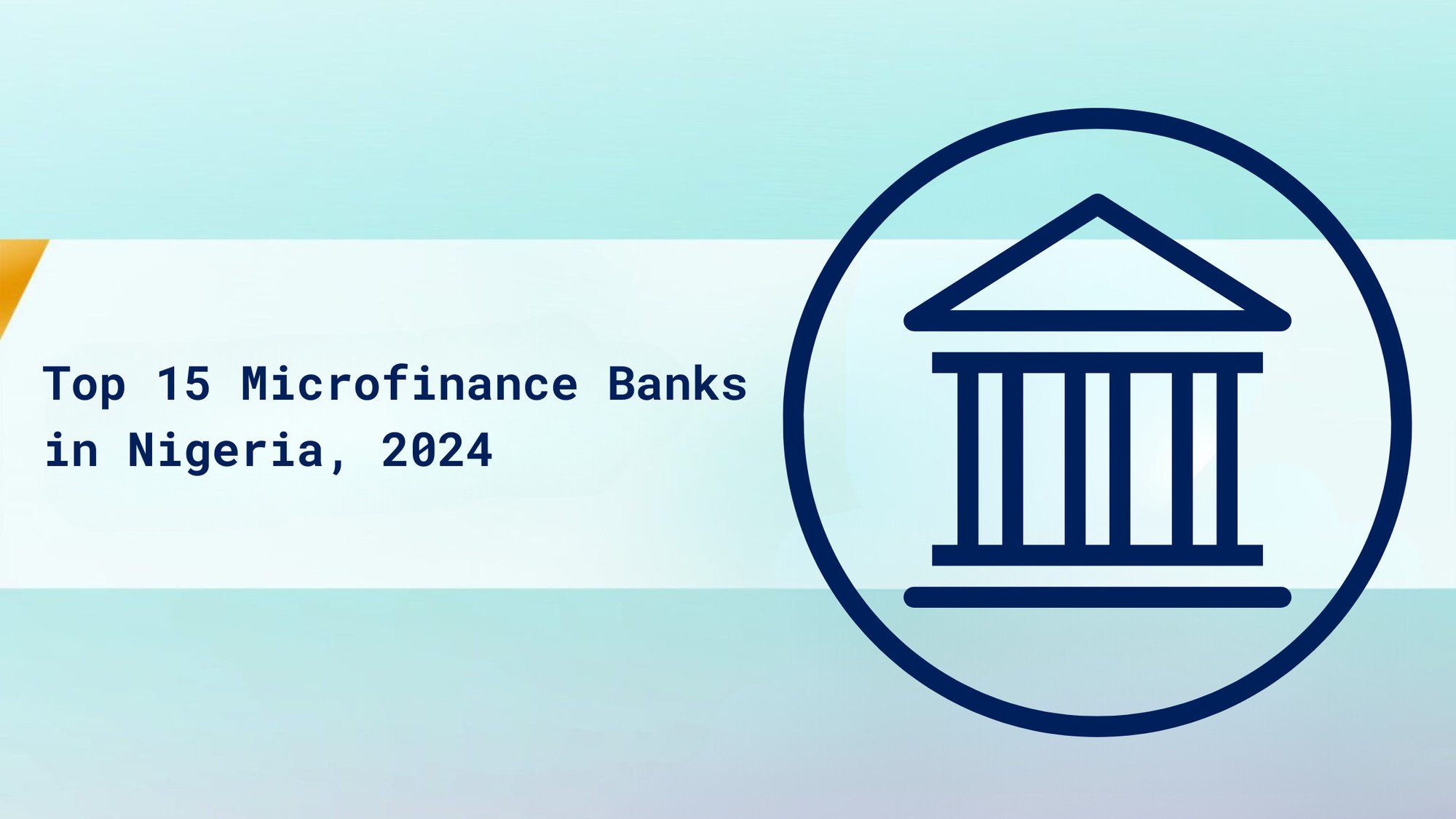
Top 15 Microfinance Banks in Nigeria, 2024
Author Taiwo Temitope-Adesope
The Central Bank of Nigeria (CBN) has approved several microfinance banks in Nigeria. Here is a list of the top 15 microfinance banks in Nigeria for the year 2024. These banks stand out for their commitment to providing financial services to small and medium-sized enterprises (SMEs) and entrepreneurs in the country. The CBN has accredited these banks based on their strong financial solutions tailored specifically for SMEs and entrepreneurs, as well as their accessibility in offering loans and savings products.
These microfinance banks play a crucial role in promoting financial inclusion and business growth in Nigeria. They provide much-needed financial services to those who may not have access to traditional banking services. By offering accessible loans, savings products, and other financial solutions, these microfinance banks help to foster entrepreneurship and economic development in Nigeria.
This article will provide an overview of the top 15 microfinance banks in 2024. It will highlight the unique features and financial solutions offered by each bank. It will also assess their impact on the financial services sector in Nigeria. Whether you are an SME owner, entrepreneur, or simply interested in the microfinance industry in Nigeria, this article will provide valuable insights into the top microfinance banks in the country.
Overview of Microfinance Banks in Nigeria

Microfinance banks (MFBs) are financial institutions licensed by the Central Bank of Nigeria (CBN) to provide financial services to the micro-sector of the economy. They play a crucial role in financial inclusion by providing access to financial services to individuals and small businesses that are otherwise excluded from the formal financial system.
Role and Importance in Financial Inclusion
MFBs are important in promoting financial inclusion in Nigeria. They serve as a source of credit and other financial services to the unbanked and underbanked population in the country. They provide loans, savings, and other financial services to micro, small, and medium-sized enterprises (MSMEs) that are not served by traditional banks. By doing so, they help to reduce poverty, create jobs, and promote economic growth.
Regulatory Framework and Licensing by CBN
MFBs are regulated by the CBN, which sets the standards for their operations. The CBN issues licenses to MFBs that meet its requirements. To obtain a license, an MFB must meet certain criteria, including having a minimum paid-up capital, a good corporate governance structure, and a sound financial system. The CBN also conducts regular inspections of MFBs to ensure that they comply with its regulations.
As of 2024, there are over 900 MFBs in Nigeria, These MFBs have a record of providing quality financial services to their clients and adhering to the regulatory framework set by the CBN.
Top 15 Microfinance Banks in Nigeria 2024
Microfinance banks are financial institutions that provide financial services to low-income individuals and small businesses. This section provides a list of the top 15 microfinance banks in Nigeria in 2024.
1. Moniepoint Microfinance Bank
2. Lapo Microfinance Bank
3. Kuda Microfinance Bank
4. Mutual Trust Microfinance Bank
5. Accion Microfinance Bank
6. Assets Microfinance Bank
7. Fina Trust Microfinance Bank
8. AB Microfinance Bank
9. RenMoney Microfinance Bank
10. FairMoney Microfinance Bank
11. VFD Microfinance Bank
12. Carbon Microfinance Bank
13. BOI Microfinance Bank
14. Fortis Microfinance Bank
15. Mainstreet Microfinance Bank
Products and Services Offered
Microfinance banks offer a range of financial products and services that are tailored to meet the needs of low-income individuals and small businesses. Here are some of the products and services offered by the top 20 microfinance banks in Nigeria in 2024.
Savings and Current Accounts
Savings and current accounts are the most common products offered by microfinance banks. These accounts provide customers with a safe and secure place to store their money, while also earning interest on their deposits. Most microfinance banks offer both individual and group savings accounts, with varying interest rates and minimum balance requirements.
Loan and Credit Facilities
Microfinance banks provide a range of loan and credit facilities to help individuals and small businesses access the financing they need to grow and succeed. These facilities include business loans, consumer loans, education loans, and agricultural loans, among others. Microfinance banks typically offer flexible repayment terms and competitive interest rates to their customers.
Digital and Mobile Financial Services
With the rise of technology and mobile devices, microfinance banks are increasingly offering digital and mobile financial services to their customers. These services include mobile banking apps, online banking, and mobile money transfers, among others. Digital and mobile financial services make it easier for customers to access their accounts and manage their finances on the go, without having to visit a physical branch.
In summary, microfinance banks offer a range of financial products and services that are designed to meet the needs of low-income individuals and small businesses. These products and services include savings and current accounts, loan and credit facilities, and digital and mobile financial services. By providing access to these services, microfinance banks play a critical role in promoting financial inclusion and economic development in Nigeria.
 Tap. Download. Solve Your Money Needs – Try FairMoney.
Tap. Download. Solve Your Money Needs – Try FairMoney.
Frequently Asked Questions
What are the criteria for a microfinance bank to be approved by CBN in 2024?
To be approved by the Central Bank of Nigeria (CBN) in 2024, a microfinance bank must meet certain criteria. These criteria include having a minimum capital base of N200 million, maintaining a minimum liquidity ratio of 20%, and having a maximum loan-to-deposit ratio of 80%. Additionally, the microfinance bank must have a sound corporate governance structure, a robust risk management system, and a good track record of profitability.
What are the benefits of banking with a CBN-approved microfinance bank?
Banking with a CBN-approved microfinance bank has several benefits. Firstly, it provides access to financial services for individuals and small businesses who may not have access to traditional banking services. Secondly, CBN-approved microfinance banks offer competitive interest rates on loans and deposits. Thirdly, banking with a CBN-approved microfinance bank helps to promote financial inclusion and economic development.
What services do the top CBN-approved microfinance banks offer?
The top CBN-approved microfinance banks offer a range of financial services, including savings and deposit accounts, loans, insurance, and financial advisory services. Additionally, some microfinance banks offer mobile banking services, which allow customers to conduct transactions from their mobile phones.
How can consumers verify the approval status of microfinance banks by the CBN?
Consumers can verify the approval status of microfinance banks by checking the CBN website or contacting the CBN directly. The CBN maintains a list of approved microfinance banks on its website, and consumers can also contact the CBN to confirm the approval status of a particular microfinance bank. Consumers need to verify the approval status of a microfinance bank before conducting any financial transactions with it.
Want more content like this? Sign up on nairaCompare!
About Author

Taiwo Temitope-Adesope
Taiwo is a passionate storyteller and strategist dedicated to empowering women and crafting compelling narratives. A First-Class graduate in Mass Communication from Covenant University, she specializes in writing, public relations, and digital marketing. As a Content Manager at Suretree, she drove a 50% increase in web traffic through SEO and boosted website engagement by 60% in just four months. Her leadership experience includes serving as Public Relations Officer for the Covenant University Student Council and contributing to impactful volunteer initiatives. With expertise in strategic thinking and business acumen, Taiwo continues to create stories that inspire confidence and imagination.
.png?width=1615&height=444&name=nairaCompare%20Christmas%20logo%20(PNG).png)





-1.png?width=352&name=blog%20header%20(12)-1.png)


